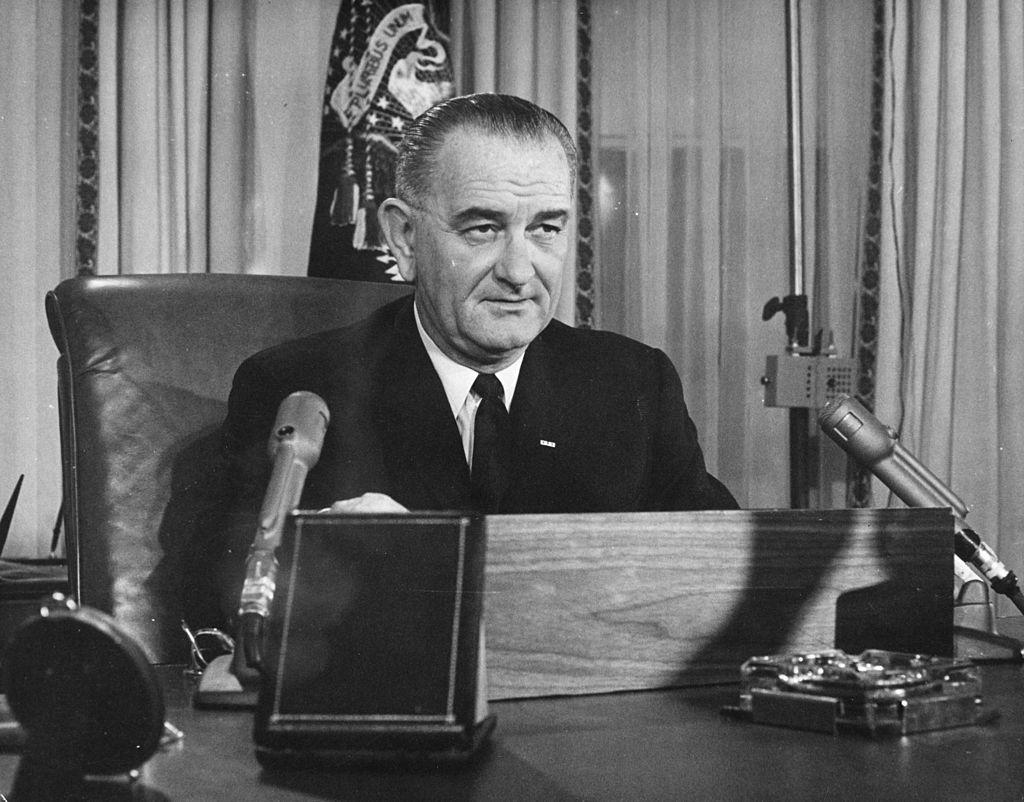Biden Should Run for Re-Election for the Same Reasons that LBJ Did Not

- Oops!Something went wrong.Please try again later.
- Oops!Something went wrong.Please try again later.
American President Lyndon B. Johnson addresses the American people on his first Thanksgiving Day television program, broadcast from the executive offices of the White House. Credit - Keystone—Getty Images
Our 36th and 46th presidents share a number of key things in common. Lyndon Johnson and Joe Biden both got elected to Congress before the age of 30, achieved great prominence in the Senate, and became vice presidents to charismatic, younger leaders who represented generational change. They also rose to become president, promulgating ambitious domestic agendas and leading a divided nation through turbulent times.
Johnson and Biden might also share something else in common; there has been wide speculation that Biden might step down from the presidency after a single term, becoming the first incumbent president to opt not to run for re-election since Johnson announced that he would not be a candidate 55 years ago today.
Six months ago, I held that hope. My reasoning was simple: The average life expectancy of an American male is 73.5. Biden would be 86 if he were to complete a second term, twice the age of John F. Kennedy when he took office. Given the enormous physical and mental burdens of the presidency and Biden’s advanced years, I believed that it would be best for him to step aside, allowing for a new generation of Democratic leaders to come to the fore. Biden would leave the office as a consequential president, having wrested the White House from Donald Trump, returned the nation to democratic norms and values, enacted the most transformative legislative program since Johnson, and revived a weakened NATO around support for Ukraine in the wake of the Russian invasion. That would have been enough.
I now feel differently. The threat to democracy at home and abroad continues to be the challenge of our time, and Biden is our greatest hope for its preservation, protection, and promotion. With no compelling Democratic heir apparent in the wings, and with the GOP still under the authoritarian thumb of Trump and a winner-take-all primary system that plays to his advantage, Biden still represents the best chance of keeping the Oval Office from Trump’s destructive grasp.
Importantly, Biden has also shown in recent months that he is up to the task of governing into his 80s, continuing to demonstrate vitality and effectiveness. Last November, he helped to engineer an impressive Midterm Election result, losing far fewer seats than historical averages despite an inflationary economy, which has proven detrimental to incumbent presidents in the past. He did so by effectively articulating the threat MAGA Republicans continue to pose to America, a message that particularly resonated with younger voters. Voter turnout was big, so were losses by most high-profile election-denying Republicans as Democrats held on to a razor-thin majority in the Senate while losing only seven seats in the House compared to 40 for Trump and 63 for Obama in his first Midterm.
Read More: How Gen Z Held Off the Red Wave
Biden then went on to give the most impressive speech of his long career in this year’s State of the Union address, sounding a message of middle-class advocacy while defiantly staring down recalcitrant Republicans aiming to cripple his presidency. If his intent was to show that he still had the political will to lead Democrats to victory in 2024, Biden delivered.
Franklin Delano Roosevelt, who Biden invoked when he campaigned for the presidency in 2020, famously saw the presidency as “preeminently a place of moral leadership,” claiming, “all of our great presidents were leaders of thought when certain historic ideas in the life of the nation had to be clarified.” Biden, exuding decency and a keen understanding of the American experience, has done just that. Though he lacks flash and has lost a step or two, he is the right man for the moment, sounding a battle cry for “the soul of America” at a time when the fight is crucial.
Johnson’s reasons for not running in 1968 were principally rooted to his health. He had suffered a nearly fatal heart attack in 1955, at age 46, and was acutely aware that his father and paternal grandfather had both died of heart attacks at age 62. (As it stood, Johnson died of a heart attack at 64, four years and two days after leaving the presidency). He was also conscious of the crises the country had endured when Roosevelt died unexpectedly of a stroke in 1945 and when Woodrow Wilson had a stroke in 1919 that had left him largely incapacitated.
Of course, there was also the issue of the Vietnam War, which dogged Johnson’s presidency and polarized the country as he steadily escalated U.S. involvement. Johnson saw not running for re-election as an overture to the North Vietnamese to agree to peace talks, which until then, had eluded him. And surely he knew that his campaign for re-election would further divide America. As Lady Bird Johnson said of his decision, “I saluted him for being clearheaded enough to see that he wasn’t the man at that particular time who could unite the country.”
It’s different for Biden who is in good health and can’t be expected to unite an America whose divisions are largely intractable. But he, as much as anyone, can ensure that America remains sound and true to our most basic ideals during a pivotal time.
Johnson chose not to run in 1968 “with America’s future under challenge right here at home, with our hopes and the world’s hopes for peace in the balance every day.” Biden should run for re-election for the same reasons.

